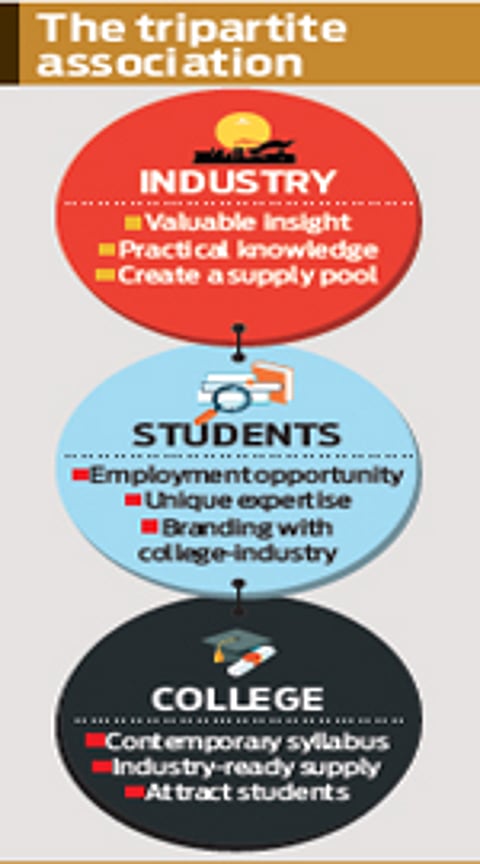When it comes to MBA, the case-study mode is on the wane, with industry interaction and live projects being the norm of the day. As more recruiters look for job-ready candidates, education institutes are fast-adopting courses and curriculum that meet industry needs. So, it is fairly common to come across colleges collaborating with industry leaders in developing course curriculum and organising training by industry players, which prepares job seekers to fit in from the day they are absorbed.
Simply put, the industry provides inputs to colleges to frame curriculum to suit their needs, based on which colleges train students. These courses not only make students understand how the industry works but also help organisations train students for their needs. “A number of subjects have been introduced considering the industry demand such as behavioural finance, financial modelling, corporate restructuring and even the syllabus of the existing subjects is revised from time to time,” says Prof. Gurinder Singh, director general, Amity International Business School and additional vice chancellor, Amity Group.
Are you Industry Ready?
Colleges are getting into tie-ups with industries to teach customised value added courses
Tailormade courses
With the industry requirements getting specific, it is important to nurture skills that will help students fit into job roles that are on offer. “We interact closely with the corporate and they share their experience with us. The electives we offer are very contemporary. It can be on quantitative finance, risk management, banking, and commodity markets, and so on, depending on the demand from the corporate side. A student chooses the electives depending on the type of career he wants after graduating,” says Dr. Debashis Sanyal, vice provost—management education & dean, NMIMS School of Business Management.
By bringing the real world into learning spaces, institutions are making students get a feel of things to come when they actually join the workforce. Course in e-banking, financial engineering, data analytics are all becoming part of the course. In some instances, the industry is also letting students use their product suite. For instance, ICICI Securities has an arrangement with Chandigarh University wherein students learn the way the stock markets function by going live on ICICI Direct platform. This way, students have the required exposure to operate on a stock market trading platform and face the world.
Industry engagement
Although the first year is same for everybody in most institutes, the change sets in from the third semeter when colleges start to focus more on industry-ready courses. The fact that students are exposed to visiting industry experts gives them a ringside view of the workings. A lot of industry trends and needs get picked up with such interactions. “Such interactions help students get an idea of what electives they could choose and shape their careers accordingly,” adds Sanyal.
At Amity International Business School, 100 per cent of the curriculum is industry-oriented and a point is made to deal with real life cases and problems to teach concepts to the students. Students have to do a compulsory internship after they complete one year. Close association with the industry helps to add value to the courses and helps in finding out how the courses can be made more targeted as per specific industry needs. “Students also get a chance to work on projects for industry partners as a part of their non-teaching credit course,” according to Gurinder Singh.
“The opportunities within finance are enormous. Two of our courses, PGDM (Financial Markets) and PGEP (Financial Markets), are a result of specialised needs of the industry,” says Prof. A M Sherry, programme chair PGP, financial markets, National Institute of Financial Management. The vast skill gap that has emerged, according to several studies that say several graduates are not employable, has been the trigger for institutions to focus on skill-based training to prepare an industry-ready pipeline of supply.

Says Prof. Vasant Sivaraman, chairperson, PGDM, S. P. Jain Institute of Management and Research: “In recent years, applications for finance specialisation have been very strong at SPJIMR. Both the numbers and the quality of applicants have led to intense demand for a place in the finance batch. On the placement front, trends in the finance specialisation in recent times have reflected shifts towards the ‘new’ economy.”
Bridging the gap
Apart from equipping students with required skills, colleges are looking to treat their finance courses from a whole new perspective. Colleges are regularly engaging with the practitioners in the industry to share resources who can run independent programmes that would help in building more skilled talent pool of prospective candidates. “Extensive access to practitioners, both for teaching and for participation in the finance area academic council ensures there is strong industry integration,” adds Sivaraman.
Also of importance is the profile of the students and their backgrounds. For instance, most MBA students come with an engineering background, which somewhat makes their analytical skills stronger and closer to what the industry eventually looks for. This, however, is a disadvantage for students with a commerce or humanities background. Adding qualifications like CFA or certificate programmes from the NISM are also preferred by recruiters, which has resulted in some colleges facilitating such courses as part of the curriculum or encouraging students to explore these independently.
A lesson for colleges is to take note of ‘FICCI Higher Education in India: Vision 2030’ document which suggests a multi-pronged approach to develop industryready students. The report calls for institutions to focus on research, career and offer courses that are technical; yet have a hands-on experience to produce industry-ready graduates. Through the implementation of such an approach, one can expect more places for students in the industry, better prepared graduates and a workforce that is able to meet the growth needs of a company.
anagh@outlookindia.com